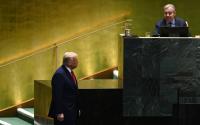7 December 2006Andrew Buncombe and Stephen Castle
The world's largest energy company is still spending hundreds of thousands of dollars to fund European organisations that seek to cast doubt on the scientific consensus on global warming and undermine support for legislation to curb emission of greenhouse gases.
Data collated by a Brussels-based watchdog reveals that ExxonMobil has put money into projects that criticise the Kyoto treaty and question the findings of scientific groups. Environmental campaigners say Texas-based Exxon is trying to influence opinion-makers in Brussels because Europe - rather than the US - is the driving force for action on climate change.
"ExxonMobil invests significant amounts in letting think-tanks, seemingly respectable sources, sow doubts about the need for EU governments to take action to reduce greenhouse gas emissions," said Olivier Hoedeman, of the Corporate Europe Observatory. "Covert funding for climate sceptics is deeply hypocritical because ExxonMobil spends major sums on advertising to present itself as an environmentally responsible company."
It has long been known that the oil giant, which in 2005 recorded an all-time record for quarterly income, has spent millions of dollars to fund climate sceptics. Exactly how much is unknown but some estimates suggest $19m (£9.7m) since 1998.
In its 2005 report, Mr Hoedeman's group details payments by ExxonMobil to two organisations the International Policy Network, which received $130,000 and the Centre for the New Europe (CNE), which received $50,000.
The Observatory suspects Exxon has also funded other groups engaged in undermining legislation. Its report said: "There is mounting evidence that many EU-focused think-tanks are heavily funded by corporations and this raises serious concerns about their agenda and their independence." The two groups cited in the report have long been accused of denying climate change. Greenpeace's ExxonSecret website notes that in 2004 the network issued a press release criticising the Intergovernmental Panel on Climate Change, saying it had "intentionally exaggerated its estimates of temperature increases by using highly implausible scenarios of future growth in emissions of greenhouse gases".
Greenpeace also lists a 2004 posting on CNE's website which claimed: "The Kyoto Protocol is failing because it is ineffective, costly, and unfair. It is also 'scientifically flawed'."
Last year The Independent revealed how a US-based lobbying group which received substantial funding from Exxon was seeking to develop a Europe-wide network of think-tanks, journalists and major businesses to act against legislation to counter climate change. The organisation claimed its approaches had been flatly rejected.
Kert Davies of Greenpeace said: "Europe is leading the world right now in terms of climate policy. Exxon know that if they can [enlist] lobbyists they may be able to slow things down. That is the tactic right now."
Such is the concern about ExxonMobil that earlier this year the Royal Society, considered Britain's leading scientific academy, wrote to it asking that it stop funding groups that have "misrepresented the science of climate change by outright denial of the evidence".
Ellen Bisnath, a network spokeswoman, confirmed that the organisation had accepted $130,000 from the oil company. She said: "We are an independent think-tank and we are contributing to the scientific debate on climate change."
CNE's president, Stephen Pollard, said: "We did get a payment in 2005 for a project which had nothing to do with climate change." He said under his leadership CNE was "not in the climate change denial business".
In a statement ExxonMobil said: "Our support extends to a fairly broad array of organisations that research significant domestic and foreign policy issues and promote discussion on issues of direct relevance to the company."
What the sponsored sceptics say
* "Now that the costs of EU environmental policies are becoming unsustainable - as the gap between the American and European rate of growth shows - "scepticism" begins to gain consideration. How long will it take to reject environmental policies that harm the economy while not making better the environment?"
Centre for the New Europe website
* "Some believe climate change is an exceptional environmental problem that requires global regulation. By reducing emissions now, it is said, we buy insurance against future catastrophic changes. But against what exactly is Kyoto insuring, and at what price? By itself, Kyoto will have little if any impact on the global climate."
International Policy Network website
"In fact, the European Union can no longer credibly blame the United States about the current state of Kyoto. The question now is whether the European Union will accept Kyoto's failure, and its own, and accept a more practical rethinking of the issue for the future. If not, it only has itself to blame."
Website of European Enterprise Institute, accused of accepting Exxon funding






